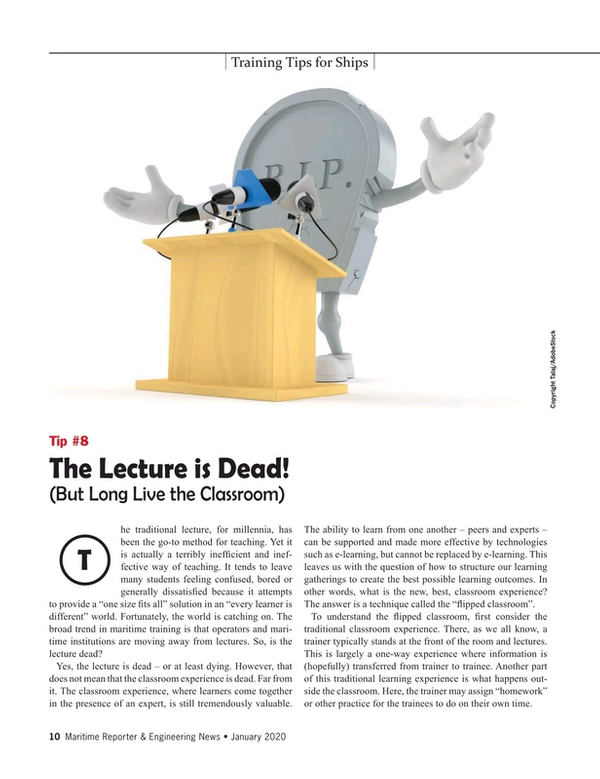
Training Tips for Ship: #8 - The Lecture is Dead
Tip #8: The Lecture is Dead … But Long Live the Classroom!
The traditional lecture, for millennia, has been the go-to method for teaching. Yet it is actually a terribly inefficient and ineffective way of teaching. It tends to leave many students feeling confused, bored or generally dissatisfied because it attempts to provide a “one size fits all” solution in an “every learner is different” world. Fortunately, the world is catching on. The broad trend in maritime training is that operators and maritime institutions are moving away from lectures. So, is the lecture dead?
Yes, the lecture is dead – or at least dying. However, that does not mean that the classroom experience is dead. Far from it. The classroom experience, where learners come together in the presence of an expert, is still tremendously valuable. The ability to learn from one another – peers and experts – can be supported and made more effective by technologies such as e-learning, but cannot be replaced by e-learning. This leaves us with the question of how to structure our learning gatherings to create the best possible learning outcomes. In other words, what is the new, best, classroom experience? The answer is a technique called the “flipped classroom”.
To understand the flipped classroom, first consider the traditional classroom experience. There, as we all know, a trainer typically stands at the front of the room and lectures. This is largely a one-way experience where information is (hopefully) transferred from trainer to trainee. Another part of this traditional learning experience is what happens outside the classroom. Here, the trainer may assign "homework" or other practice for the trainees to do on their own time.
In the flipped classroom, the in-class experience and the outside-class experiences are "flipped". That is, instead of lectures happening during class time, trainees are asked to watch videos of lectures or are assigned some e-learning module outside the classroom – before class. Then, when the trainees arrive in the classroom, instead of being lectured to, trainees are able to ask questions, participate in group discussions, and practice or solve problems as teams or individuals in the presence of (and with the guidance of) the expert trainer. This allows them to reinforce the knowledge they gained and put it into practice. Simple, but very different.
There are clear advantages to this model. First, one-way lecture experiences do not require a "live" lecturer. Video lectures or e-learning can be used as a substitute for the lecture experience. In fact, these technologies, done in the learner’s own time before the classroom experience, have the advantage of allowing the learner to tailor their experience to their own level of background knowledge and learning abilities. This is not true for lectures.
Once the pre-learning portion of the flipped classroom is done, the trainer is freed from lectures and his or her time can now be used doing much more "high value" and more educationally effective interactive work with the trainees (the "in-class" part of the flipped classroom). They can work on problem sets, engage in practice, perform demonstrations or hold discussions, all of which greatly benefit from the presence and guidance of the trainer. In some sense, this is what an experienced trainer is meant to do: observe trainees, give practical guidance, correct performance and help trainees gain skills. The knowledge transfer part (the lecture) has many viable and more effective alternatives. Why not use them and put the trainer to work doing real training?
The flipped classroom movement has been growing exponentially – by approximately 60% yearly. Research shows that trainees prefer it and that training outcomes can be improved. So as the industry continues its move away from lectures, the flipped classroom may be just the place to move toward.
Until next time, sail safely, and all the best for a healthy, happy and safe new decade.
Read Training Tips for Ship: #8 - The Lecture is Dead in Pdf, Flash or Html5 edition of January 2020 Maritime Reporter
Other stories from January 2020 issue
Content
- Training Tips for Ship: #8 - The Lecture is Dead page: 10
- Offshore Wind: The Domino Effect page: 14
- IMO2020: Low Sulfur Fuel Potential Pitfalls page: 16
- Want to Cut Emissions? SLOW DOWN page: 18
- Anatomy of a Marine Casualty Investigation page: 24
- Anatomy of a Marine Casualty Investigation page: 24
- Ship Repair: How to Foil Well-laid Plans page: 28
- Are OSVs Fit for Refit for Offshore Wind? page: 32
- @ Glosten: “Crazy ideas are not off the table” page: 36
- Ship Repair: Bayonne Drydock Invests in Shiplift page: 42


